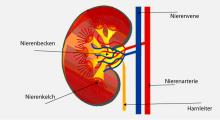– Infringement inflammatory kidney glomeruli, of immunologic origin, most often occurring several weeks after a streptococcal infection (tonsillitis, skin infection or other infection). It mainly affects children more than 3 years and young adults.
– The prognosis is sometimes put into play by the importance of fluid retention (OAP, cerebro-meningeal edema). But evolution is almost always favorable: clinical signs have disappeared within days of proteinuria in a few weeks, the macroscopic haematuria few months.
Clinical signs:
– Salt and water retention of varying importance, sometimes limited to discrete eyelid edema; Sometimes edema of the lower limbs (soft, painless, pitting); Sometimes major: acute pulmonary edema (APO) or cerebral edema sometimes indicative of disease seizures.
– High blood pressure (HBP)
– Macroscopic hematuria
– Oliguria with concentrated urine
– Often abundant Proteinuria
Treatment:
– Bed rest, unsystematic
– Strict salt and water restriction
– In case of significant edema only:
furosemide PO
Children: 1-2 mg / kg / day in 2 divided doses
Adult: 40 to 60 mg / day in 2 divided doses
– Treatment of complications of fluid retention:
• HTA
• PAO
• convulsions
– Treatment of infection if it is still present during acute glomerulonephritis episode.

Leave a Reply